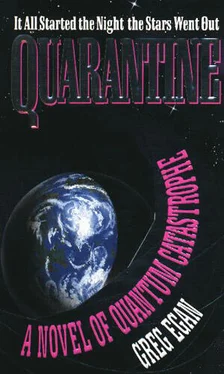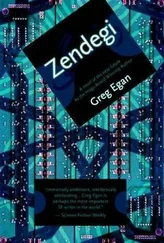Because alone, divided, we'd have no hope whatsoever of reforming the sham Ensemble, of rebuilding it as it should be. United, the prospect is daunting — but not quite unimaginable.
My work goes on as if nothing had changed. The temptation to confide in Po-kwai, to explain everything that I'm going through and everything that's been concealed from her, is almost overpowering at times — but not when I'm actually in her presence, with P3granting me limitless self-control. Chen's instructions may no longer compel me to keep silent about Laura and BDI — but the need to protect the Canon now takes priority, and I find myself even more guarded with her than before. She seems puzzled by this at first, but then shrugs it off and withdraws into her reading. Our evening discussions of quantum metaphysics and invisible Bubble Makers come to an end. Primed, this makes no difference to me — but at home each morning, looking back on the featureless hours I've spent in the stake-out trance, I feel a strange, hollow ache in my chest, and it keeps me from choosing sleep.
The second phase of the experiment begins. Po-kwai returns to the ion room, her head full of radiolabeled glucose and neurotransmitter precursors, ringed by arrays of high-resolution gamma cameras. Very thoroughly observed — at least by the machinery. The data gathered by the gamma cameras, though, can be processed in a variety of ways, to reveal, or not to reveal, the operations of various parts of her brain — and the choice as to what will be shown to the experimenters (or rather, co-participants) on the control room screen will be made at random, at the last moment, by the computer.
'It's a bit like Aspect's delayed-choice photon experiments of the nineteen eighties,' she explains. 'Leung has worked out a kind of souped-up version of Bell's Inequality, a correlation between certain neurons firing or not firing, which ought to be below a threshold value — if all our assumptions are correct.'
The technicalities are over my head, but I get the gist of it easily enough: my hopeful alternative explanations for the role of the putative wave-collapsing pathways are about to be thoroughly demolished.
Meaning what? I'm going to have to swallow a universe where I'm the heir to an incomprehensible act of genocide? I contemplate this prospect more and more frequently, but it still leads nowhere. I try feeding myself comforting parallels from evolution: I never felt guilty about the dinosaurs, did I? In fact, if Po-kwai is right, then the dinosaurs might not even have existed — in the sense that modern animals exist — until some mammal came along and made the past definite and unique, collapsing all the countless possibilities into a single evolutionary pathway. It all begins to sound reassuringly like one of those fatuous, entirely untestable, metaphysical conjectures: 'Maybe the universe was created this morning, complete with false memories for everyone, and perfectly faked archaeological, paleontological, geological and cosmological evidence for events spread over the last fifteen billion years …'
The only trouble is, the heart of Po-kwai's conjecture is testable. And the unpursuable idea spins on in my head, untouched, unanswered.
This time, the ion room is kept soundproof, and if Po-kwai mutters the results to herself as an aid to concentration, we're spared the ordeal of listening to her. Instead, the central console is the means by which Leung, Lui and Tse will collapse selected parts of her brain. I glance at the displays myself, now and then, but the PET scans, neural maps and histograms, colourful though they are, are too cluttered, and too cryptic to me, to capture my attention, and I have no trouble turning away.
I naively expected instant results, but there are flaws to be sorted out, in the equipment, in the software, in Po-kwai's now rusty command of the mod. No longer awash in the data, and unable to decipher the displays, I virtually lose interest while I'm on duty, even shutting out the chatter of the scientists. Primed, this is how it should be. Whatever ruling the Canon might eventually make on the worth of these experiments, my present role is perfectly clear: I'm to do the job that the sham Ensemble expects of me, as diligently as if my allegiances were unchanged.
Off duty, deprimed, I find myself wondering: maybe the Canon — just like the Bubble, just like the truths of quantum ontology — makes no difference at all, in the end. Maybe, in practice, the real and the sham Ensembles will never diverge — and the distinction, crucial as it is to the members of the Canon, will remain an abstraction. Neither Lui nor anyone else has yet told me what the Canon would actually change, if it could control the sham Ensemble — and my own knowledge of the issues is still too hazy for me to have any firm opinions. I know I believe that Po-kwai ought to be told about Laura, and told how the mod was designed — but I stop short of doing so, realizing that I'm in no position to predict the consequences.
Maybe the Canon's only real function is to make our ineffectual heresy seem more tangible to us. Maybe we'll plot and conspire, to prove that we're free to plot and conspire — but in the end it will be nothing but a conspiracy of obedience.
As I step out of the bedroom, in the middle of the nightly ritual check of the apartment, Po-kwai says casually, 'We had a good set of data today. Virtually conclusive. Definitely publishable — if I can use that word under the circumstances. I didn't tell you in the restaurant… you see, I'm learning to keep my mouth shut.'
'Congratulations.'
'For what? Keeping my mouth shut?'
'For the result.'
She scowls. 'Don't be so reasonable, it makes me sick. You didn't want us to be right. I don't expect you to slit your wrists, but can't you at least be a little … sullen?'
'Not on duty.'
She leans against the doorframe, sighing. 'Sometimes, I really do wonder which of us is the least human — you on duty, or me when I'm smeared.'
'Smeared?'
'Uncollapsed; in multiple states. That's what we call it: smeared.' She laughs. 'That will be my claim to fame: the first human being in history to smear at will.'
The opportunity to contradict her, to mention Laura, hangs in the silence, tantalizing for a moment — but the risk of what it could lead to is too great. Which doesn't mean that I can't still probe around the edges. 'At will, yes — but couldn't someone have suffered neurological damage, and lost their ability to collapse the wave?'
She nods. 'Good point. That might well have happened. The thing is, nobody would ever know, nobody could ever tell. Every time such a person interacted with someone who did collapse the wave, they'd be reduced to a single history, a single set of memories — and they wouldn't even know, themselves, that anything was different.'
'But — while they were alone…?'
She shrugs. 'I don't know what it means to ask that. I've told you, I end up with just one set of memories myself. The effects prove that I've been smeared, but of course someone with brain damage wouldn't have the mod's control over the eigenstates — so other people would collapse them according to exactly the same probability distribution that would have applied if they'd collapsed themselves. The end result would be the same.' She laughs. 'I expect Niels Bohr would have said that such a person was the same as everyone else. If there's no way for anyone, the person included, to know what they "experienced" while they were unobserved, how can it be considered real? And I'd half agree with him: I mean, however long they went between contact with other people, each time an observation actually took place, all the states they'd occupied — all the multiple thoughts and actions they'd "experienced" — would collapse into one, perfectly mundane, linear sequence.'
Читать дальше










